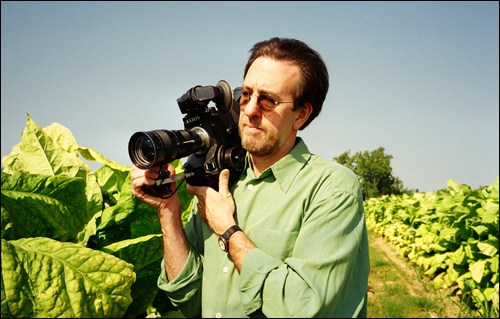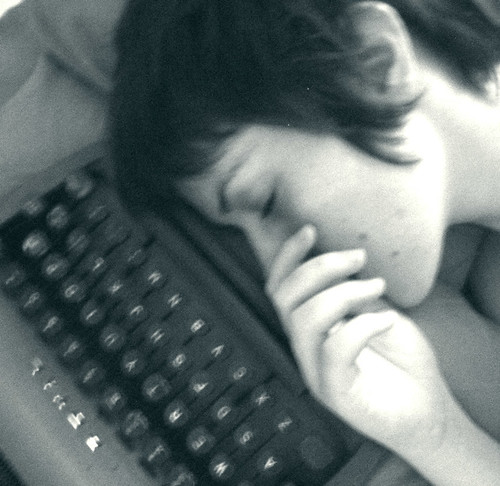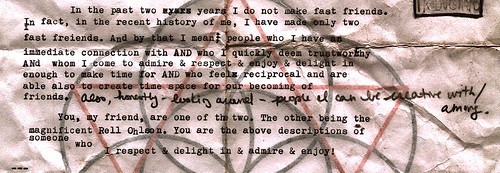TIME STAMP:
Wednesday, June 07, 2006
TITLE:
worth living
BODY:
Life is very much a possession.
9:06 AM - 8 Comments - 2 Kudos - Add Comment - Edit - Remove
Thoracles Odinrocker
One of the more interesting depictions of the consequences of suicide upon the dead comes from Neil Gaiman's "Sandman" series: As in Catholic exegesis of scripture, those who commit suicide are condemned to Hell; Gaiman has them turn into gnarled trees, void of leaves. The Sandman remarks that after an one hundred year absence from visiting Hell (the later quarter of the 19th century and the first three-quarters of the 20th) what was once a grove has turned into a dense and sorrowful forest. I find the image to be heart-breaking, particularly in taking into consideration the commentary on modern society's effect(s) upon human moods etc implied in Sandman's remarks.
I am bound to ask by the subject matter of this blog: are you thinking about suicide? Because if so, I better be the person you take with you....We cannot carry the Post Deenaism torch without you to guide the haphazard way.
Posted by Thoracles Odinrocker on Wednesday, June 07, 2006 at 10:10 AM
[Remove] [Reply to this]
Exeter
The thought that a day may come when Deenaism becomes Post is more than a little upsetting.
Posted by Exeter on Thursday, June 08, 2006 at 5:39 AM
[Remove] [Reply to this]
The Bashamo
old school jonathan, you're the sweetest!
Posted by The Bashamo on Thursday, June 08, 2006 at 10:37 AM
[Remove] [Reply to this]
The Bashamo
I am thinking about suicide as a subject matter, not as a course of action.
I'm way too much of a positive thinker and I have way to much to do to be suicidal right now. Maybe later.
But the plan is that I'll have eaten so much fatty foods, drank, smoked, etc that I won't have to deal with too much of a decline and I'll die early enough after having done enough.
Posted by The Bashamo on Wednesday, June 07, 2006 at 10:54 AM
[Remove] [Reply to this]
anna
i don't know enough about philosophy to make an educated argument, but i can share my opinion. the only time suicide seems logical - if you can even call it that - is if you know your life from this point on will be devoid of any significant pleasure. although a masochist may look forward to pain, i'm not really considering him. so, if you know you will only experience pain from here on out, you may as well kill yourself. the problem is that we can never know and therefore, may deprive ourselves from something wonderful. however, if we're dead we won't know what we're missing anyway.
Posted by anna on Thursday, June 08, 2006 at 8:52 AM
[Remove] [Reply to this]
Christopher el Mexicano Barbudo Rojo
There is, to be sure, something to what you are saying here, but might I suggest, to help differentiate between the types of suicides which you enumerate, that we, perhaps, reintroduce the concept of the martyr?
I, of course, decry suicide of all types, as it is the ultimate attack on all life, on your own, and on the world's, it is, from a subjective point of view, a final and ultimate attack on reality--but of course, reality still wins. But to abandon one's life for the sake of another, if that be suicide, is a very different sort of thing--I don't know if that is what you mean by a "bold suicide" or not, but that is all I can think that it might mean. I would highly recommend that you read G.K. Chesterton's comments on suicide in his book Orthodoxy; as much as the work is not "serious" philosophy, it is one of the finest and most thorough treatments of the issue I have ever read.
Happy thinking, enjoy the fatty foods, and God Bless.
Posted by Christopher el Mexicano Barbudo Rojo on Thursday, June 08, 2006 at 9:01 PM
[Remove] [Reply to this]
Thoracles Odinrocker
There are only two suicides that currently come to mind as being even close to "right" or justifiable:
1) Hunter S. Thompson. He is the expression of a right that is often ignored by many, but is always there nonetheless: the right to die. At the end of his life he couldn't even make it up a simple flight of stairs on his own. For someone who embodies the ideal of freedom, being held hostage on the first floor of one's own home is a terrible prison ("In prison I hear there's time to be good, but the first thing you see is the last thing you should" - Black Rebel Motorcycle Club). There is something to be said for dying well, and you have to ask yourself if extending a life of physical pain and torment accompanied by psychological deterioration is a life worth living at all. What good can you accomplish for yourselves or others other than to remind them of the person you once were, and to placate their fears of a world without you - particularly when the world with you has become a burden to them beyond what is considered a reasonable cross to bear which brings me to my second suicide....
2) Jesus/God. Okay, so all of you Catholics out there are now most likely too furious with me to continue reading my argument, so go ahead and stop now and write that dastardly response that is itching under the cuticles of your righteous fingers. For the rest of you: according to Christian scripture God gave himself in the form of Jesus - a being who is/was 100% Divine and 100% human - in order to save us all. God did not have to do this, as God can do anything, but since he rigged the game in the Garden of Eden...heck even from Lucifer the Morningstar's rebellion (but this is another discussion that calls for much wine and some pompously proposterous cheese), he felt it was necessary to die an unnatural death (ie a violent one; one not brought about by time and old age...which one would also have to wonder if Jesus would EVER had died since he was, well, God...man we need to open up a Circle K with all these cans of worms...). He for-knew his death (see the Garden of Gethsemene (totally butchered the spelling, I am sorry)) and he allowed it to happen. Of course this is only suicide if you view allowing your death to take place at the violent hands of another when you could have easily stopped it as suicide. Anyway, for those of you still reading, you must really hate your job. Get back to the TPS Reports. That'd be great. Uh huh. Yeah.
Posted by Thoracles Odinrocker on Friday, June 09, 2006 at 7:37 AM
[Remove] [Reply to this]
Christopher el Mexicano Barbudo Rojo
Hi, I'm Catholic and I don't think that my response is particularly righteous or anything, in fact, I merely wanted to say that I more or less agree with what you said about Christ (Hunter S. Thompson is another, as you put it, can of worms); the point, however, is the one I would employ to call Christ's "suicide" a sacrifice. There is and must be a differance. The man who throws himself on the grenade that his friends might not perish does not commit suicide, nor does he who allows himself to be crucified that we may live. That's all really. (oh, and your point about Christ not dying a natural death, being God and all, is a good one: it puts the sacrifice in context. He did not merely give up life like a mortal would, for all mortals must die, but Christ gave up eternal life. Death, after all, is the wage of sin, and since Christ had not sin it stands to reason that he would have suffered not death. Amazing really.)
I hope that wasn't a "dastardly" response.
Posted by Christopher el Mexicano Barbudo Rojo on Tuesday, June 13, 2006 at 12:48 PM
[Remove] [Reply to this]










